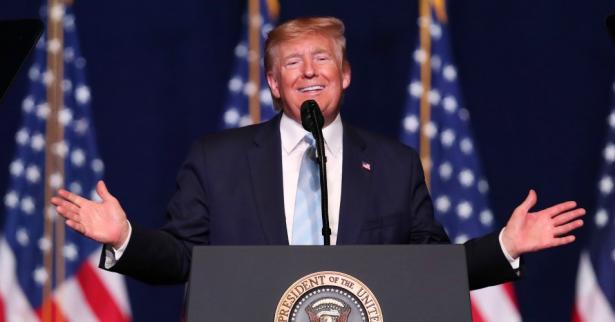The Trump administration has publicly insisted that the U.S. assassination of Iranian military leader Qassem Soleimani was justified because he was planning "imminent attacks" against American forces and diplomats in the region, but the White House has yet to offer a shred of evidence substantiating this narrative.
That may be because, as New York Times reporter Rukmini Callimachi wrote in a detailed Twitter thread Saturday morning, the evidence is sparse to non-existent.
According to two U.S. officials who received intelligence briefings in the wake of Soleimani's assassination, which was ordered by President Donald Trump, "the evidence suggesting there was to be an imminent attack on American targets is 'razor thin,'" Callimachi reported.
"In fact the evidence pointing to that came as three discrete facts," Callimachi wrote. Those three facts, according to Callimachi, were Soleimani's "pattern of travel," his request for the Iranian Supreme Leader's approval for an unspecified "operation," and Iran's supposed "increasingly bellicose position towards American interests in Iraq."
"As one source put it, a) + b) + c) is hardly evidence of an imminent attack on American interests that could kill hundreds, as the White House has since claimed," Callimachi wrote. "The official describes the reading of the intelligence as an illogical leap."
Callimachi closed her viral Twitter thread by raising a question about the timing of Soleimani's assassination.
"Why now?" she asked. "Hard to decouple his killing from the impeachment saga."
1. I’ve had a chance to check in with sources, including two US officials who had intelligence briefings after the strike on Suleimani. Here is what I’ve learned. According to them, the evidence suggesting there was to be an imminent attack on American targets is “razor thin”.
— Rukmini Callimachi (@rcallimachi) January 4, 2020
6. One official described the planning for the strike as chaotic. The official says that following the attack on an Iraqi base which killed an American contractor circa Dec. 27, Trump was presented a menu of options for how to retaliate. Killing Suleimani was the “far out option”
— Rukmini Callimachi (@rcallimachi) January 4, 2020
CNN legal analyst Susan Hennessey said in response to Callimachi's tweets that "if this thread is accurate then both the policy and legal justifications for the strike about to crumble."
Yale Law School professor Oona Hathaway, an expert in international law, echoed Hennessey:
If this reporting is correct, then the legal claim that the President had the right to act on his own as a matter of domestic and international law completely falls apart. Both legal claims depend on an imminent threat requiring an immediate response. https://t.co/sSQlNBqCRv
— Oona Hathaway (@oonahathaway) January 4, 2020
Ezra Levin, co-executive director of progressive advocacy group Indivisible, put it more bluntly: "They're lying to distract from impeachment. They're lying to get us to war. They're lying to shore up reelection. Don't buy any of it."
Trump, in remarks to reporters Friday, claimed Soleimani was plotting "sinister" attacks on Americans, parroting Secretary of State Mike Pompeo's claim that the Iranian general "was actively plotting in the region to take actions... that would have put dozens if not hundreds of American lives at risk."
"But we caught him in the act," Trump said. "Under my leadership, America's policy is unambiguous towards terrorists. We will find you, we will eliminate you."
During a press briefing on Friday, State Department officials repeatedly declined to offer specific details about the supposed intelligence on these "imminent" attacks that purportedly led Trump to order the strike on Soleimani, which also killed a prominent Iraqi militia leader.
One official chafed at a question that likened the Trump administration's claims about Iran to the Bush administration's falsehoods in the build-up to the 2003 invasion of Iraq.
"You're not going to make the Iraq comparison," the official said when asked why the White House's narrative about imminent Iranian attacks should be believed.
After reading a transcript of the State Department briefing, Ploughshares Fund president Joe Cirincione said he "could not believe the arrogance of the State officials."
"Insulting reporters, refusing to answer direct questions," Cirincione tweeted. "They did not provide one iota of evidence to back up their claims of imminent attack."
This is the world we live in. This is the world we cover.
Because of people like you, another world is possible. There are many battles to be won, but we will battle them together—all of us. Common Dreams is not your normal news outlet. We don't survive on clicks. We don't want advertising dollars. We want the world to be a better place. But we can't do it alone. It doesn't work that way. We need you. If you can help today—because every gift of every size matters—please do. Without Your Support We Won't Exist.


Spread the word